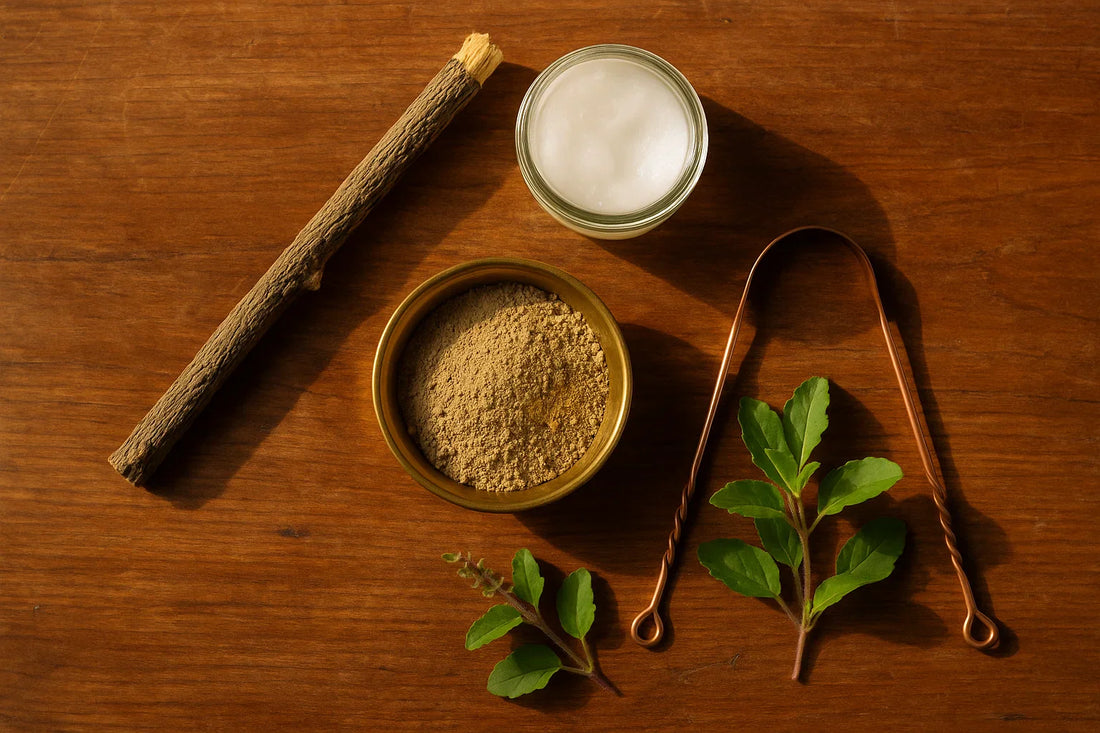
Ayurvedic Dental Care: Ancient Wisdom for Modern Oral Health
Let’s be honest. Most of us never question what’s in our toothpaste or mouthwash—we just use what’s on the shelf. But Ayurveda? It was centuries ahead. Long before dental floss and fluoride, ancient Vaidyas mastered oral hygiene using plants, oils, and rituals.
In fact, oral health wasn’t just cosmetic in Ayurveda—it was a vital window into digestion, immunity, and longevity. And it still holds up today.
So, what can we learn (and reclaim) from this lost science?
🌿 Dant Dhavan: The Morning Ritual You Never Knew You Needed
In Ayurveda, “Dant Dhavan”—the act of cleaning your teeth—was done right after waking up, but not with plastic brushes or synthetic foam. Instead, people used:
🔸 Herbal Chewing Sticks
Twigs from neem, babool (acacia), karanja, or licorice were chewed until they frayed and then used to brush teeth gently. These were antibacterial, naturally astringent, and left no chemical residue.
🟢 Neem, in particular, is still celebrated for its anti-plaque and antifungal properties, and you'll find it in many Padmved formulations for detox and immunity.
Oil Pulling (Gandusha or Kavala): Not a Trend, a Tradition
You’ve probably seen it on Instagram—swishing coconut oil in your mouth for 15 minutes. But oil pulling isn’t new.
Ayurveda prescribed Gandusha (filling the mouth completely with oil) and Kavala (gargling smaller amounts) to:
- Pull toxins (Ama) from oral tissues
- Strengthen teeth, gums, and jaw
- Prevent mouth ulcers, dryness, and even bad breath
✅ Oils used: Sesame oil, coconut oil, or herbal oils infused with cloves or triphala.
Pro Tip: Make it a morning ritual, just after tongue scraping. Swish for 5–15 minutes, spit it out, rinse, and feel the freshness.
Herbal Powders > Toothpaste
Forget harsh chemicals or synthetic whiteners. Ayurvedic oral care relies on herbal powders (choornas) made of:
- Triphala – for gum strength and healing
- Clove (Lavanga) – for toothache relief and bacterial control
- Rock salt – for reducing inflammation and cleaning plaque
- Cardamom & cinnamon – for natural freshness and cleansing
You could mix these with a few drops of ghee or coconut oil and brush with your fingers—or even a neem stick.
The Link Between Oral Health and Digestion
Here’s the deeper layer most people miss: your mouth is the first part of your digestive tract.
Ayurveda teaches that poor oral hygiene increases Ama (toxins), disrupts Agni (digestive fire), and can even imbalance your doshas. Bleeding gums? That's often a Pitta issue. Bad breath? Likely Ama buildup from weak Agni.
So, your oral care isn’t just about pretty teeth—it’s a mirror to your internal health.
Ayurvedic Tips for Stronger Oral Health Today
Let’s bring it all together. Here are 7 ways to level up your dental hygiene—Ayurveda style:
- Oil pull daily with sesame or coconut oil
- Use herbal tooth powders instead of synthetic toothpaste
- Try neem sticks once or twice a week for natural brushing
- Scrape your tongue every morning to remove toxins
- Avoid overconsumption of sugar, especially at night
- Chew fennel or cardamom seeds post meals
- Sip warm water through the day to aid digestion (and reduce mouth dryness)
🔗 More from The Wellness Edit by Padmved
- Want to understand the Ayurvedic Approach to Skin Health? Read here
- Explore how Triphala is the reset button for your eyes.
- Read: Ayurveda for Gut Health to understand how oral health connects to digestion
To learn more about the modern research on oil pulling and Ayurvedic oral hygiene, check out this PubMed review
